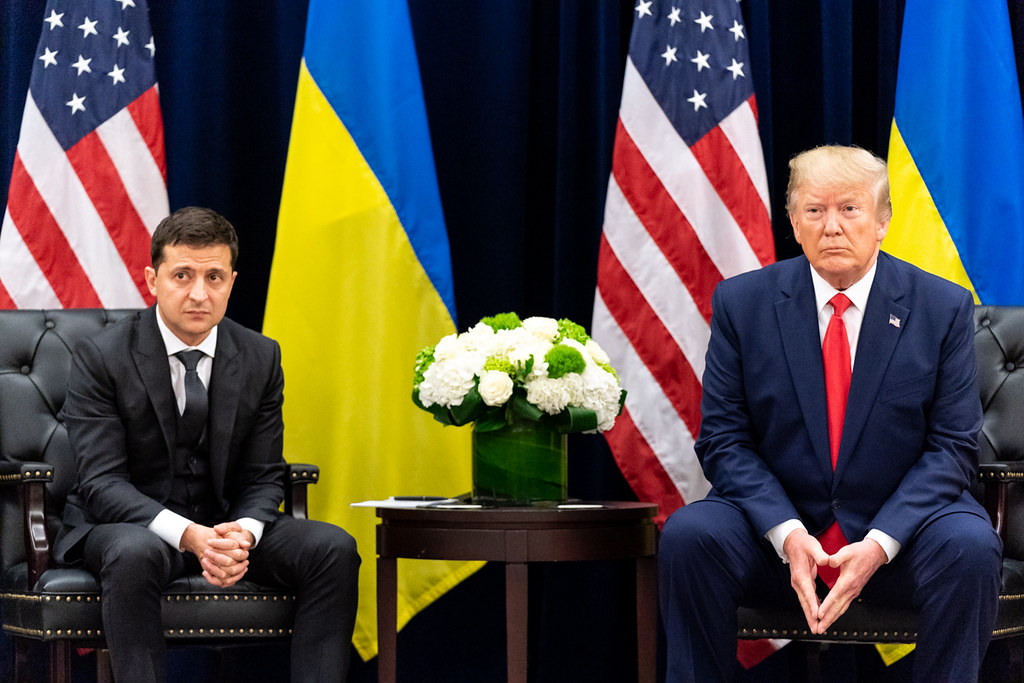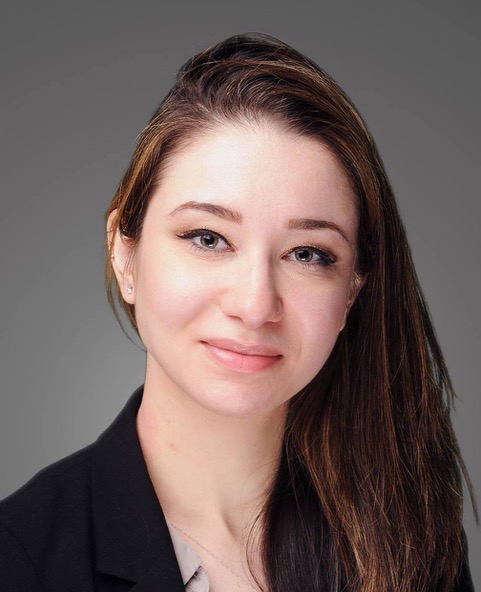Recent Ukrainian Perspectives on the Trump-Ukraine Scandal
What is the Ukrainian media emphasizing about the scandal—and what statements are politicians, agencies and journalists making in the country on the other end of the phone line?

Published by The Lawfare Institute
in Cooperation With

The Trump-Ukraine scandal is moving quickly. On Oct. 4, the New York Times reported that Ukraine’s prosecutor general, Ruslan Ryaboshapka, would review the criminal case into Ukrainian gas company Burisma, which employed Hunter Biden on its board from 2014 to 2019. The Times notes that this “raises questions of whether Ukraine was, in effect, bowing to public and private pressure from the president of the United States, on which it has depended on [sic] for millions of dollars in aid.” Meanwhile, Congress has released a selection of text messages provided by former U.S. Special Envoy for Ukraine Kurt Volker, in which U.S. diplomats voice concerns that U.S. military aid to Ukraine has been conditioned on the Ukrainian government’s help with President Trump’s political campaign.
As the news continues to develop, it’s also useful to consider the Ukrainian perspective on recent events. What is the Ukrainian media emphasizing about the scandal—and what statements are politicians, agencies and journalists making in the country on the other end of the phone line?
To get a sense of where things stand, I reviewed a range of Ukrainian news coverage and official government statements from Sept. 24 to Oct. 2. The Ukrainian press reports in Russian, Ukrainian and sometimes English; I’ve noted below where I am translating or paraphrasing from coverage in Russian or Ukrainian.
President Volodymyr Zelensky’s statements have focused on asserting Ukraine’s independence and denying that Trump placed any undue pressure on him to investigate Joe Biden and Crowdstrike. Zelensky sat down with Trump on the sidelines of the U.N. General Assembly on Sept. 25. The previous day, in a quick interview with the U.S. government-funded news agency Voice of America, Zelensky said that the Ukrainian delegation was “ready for everything” and that he thought “our meeting [with Trump] will be very warm.”
During the Sept. 25 meeting with Trump, Zelensky declared that “[n]obody pushed me” to open any investigation. He said afterward to Censor.net, a source of Ukrainian news, that the only person who can put pressure on him is his son. He commented, “I can repeat again. We can talk about support. And ‘asking’ is definitely not about Ukraine. Ukraine is a new country, strong, no one is asking for anything, we can help ourselves.”
On Sept. 30, Zelensky offered another attempt to navigate the rough waters of the scandal. According to the Russian-language version of Ukrainian Pravda (“pravda” means “truth”), Zelensky stated that Ukraine does not conduct investigations on the orders of other countries. Additionally, on Oct. 1, the news outlet LB.ua reported in Russian that Zelensky said he never met or had phone conversations with Trump’s personal lawyer, Rudy Giuliani. Podrobnosti, another source of Ukrainian news that is published in Russian, similarly reported Zelensky’s reiteration that he never experienced pressure. In the briefing, Zelensky further said that there are people from the West and from within Ukraine who want to influence him, but that he is the president of an independent Ukraine. He said his actions show that it is impossible to influence him.
While Zelensky has commented at length in the press, the office of the Ukraine president has been conspicuously silent on the scandal. But the office hasn’t been entirely quiet: On Oct. 1, the press office publicized a meeting Zelensky had with actor Tom Cruise in Kyiv.
Zelensky’s statements and other news coverage reflect deep concern over continued U.S. assistance to Ukraine. In the Sept. 24 Voice of America interview, Zelensky also said, “We just want the U.S. to always support Ukraine and Ukraine’s course in its fight against aggression and war.” Zelensky’s press office noted his statement, translated here from Ukrainian: “The most important thing is that we all should understand that the U.S. supports Ukraine.” The next day, the press office emphasized that Ukraine would need U.S. and EU support to end the war with Russian-backed separatists in the country’s east. Notably, the press statement quotes Zelensky as stating that there are two wars: the first being corruption, and the second being the war in the Donbass. At the U.N. General Assembly, Zelensky said, “[N]o one of you will be able to feel safe when there is an ongoing war in Ukraine, when there is a war in Europe.”
On Oct. 2, the Russian version of Censor.net reported U.S. Secretary of State Mike Pompeo’s statement that the scandal regarding the telephone conversation between Zelensky and Trump would not prevent the U.S. from assisting Ukraine. UNIAN, an English-language Ukrainian news outlet, reported similarly.
Another topic of concern for Ukraine is the Nord Stream 2 pipeline—previously discussed on Lawfare in this timeline of the Trump-Ukraine scandal—which Russian energy company Gazprom is currently constructing and which would connect Russia and Germany through the Baltic Sea. Ukraine, Poland and the U.S. have opposed the construction of Nord Stream 2 because it would increase European reliance on Russian energy sources, which Russia could then leverage politically. The U.S. House and Senate Foreign Relations Committees approved bills over the summer to impose sanctions on the pipeline. Zelensky opposes its construction as well: Podrobnosti reported in Russian on Aug. 31 that Zelensky had described the pipeline as unacceptable and a threat to all of Europe.
In July 2019, Ukrainian Pravda reported that Zelensky said he hoped for Trump’s assistance in countering the construction of this pipeline and that he was sure that Trump was the only person who would resolve this issue in Ukraine’s favor. Similarly, on Sept. 26, UNIAN reported Zelensky’s statement that his phone conversation with Trump took place during a “difficult period,” when the Russian delegation had returned to the Parliamentary Assembly of the Council of Europe (PACE) and sanctions could therefore no longer strongly deter Russia from implementing Nord Stream 2. Zelensky stated that Nord Stream 2 “is a major threat to our energy security” and that “I stand by every word I say” regarding his prior criticism of EU leaders.
Trump’s pressuring of Zelensky relied in part on allegations that Joe Biden’s son, Hunter Biden, had engaged in corrupt activity in relation to his role on the board of the Ukrainian gas company Burisma—and that Ukrainian prosecutors were investigating Burisma before Vice President Biden forced them to stop. Hunter Biden joined the board in April 2014 and remained on the board until early 2019. On Sept. 27, the National Anti-Corruption Bureau of Ukraine (NABU) said in a Facebook post in Ukrainian that the board is not investigating and had not investigated the board of directors of Burisma after Hunter Biden joined the board in 2014, although the post does not mention him by name. A linked post from May 2019 discusses the two active cases related to Burisma’s owner, Mykola Zlochevsky.
Despite the NABU’s post, on Oct. 1, former Prime Minister of Ukraine Nikolay Azarov posted on Facebook, in Russian, that Ukraine should investigate Hunter Biden and his involvement with Burisma. Azarov said that he does not know whether Hunter Biden did anything illegal, but it is in Ukraine’s interest to find out whether, according to Ukrainian law, Biden did work to warrant his salary as a board member.
Former Prosecutor General Yuriy Lutsenko—who alleged in the spring of 2019 that he had been prevented from investigating the Bidens, though he later recanted this allegation—said in a Sept. 30 interview with Ukrainian BBC that he is ready to testify in Congress regarding impeachment. In the interview, Lutsenko claimed that he never spoke to Trump but met with Rudy Giuliani more than once to discuss the investigation into Burisma. Lutsenko further stated that the conversations with Giuliani were standard and that Giuliani did not make any demands. They discussed whether it was possible to investigate the Bidens in Ukraine, and Lutsenko concluded that there was no basis for an investigation in Ukraine but that would be the jurisdiction of the U.S.
The next day, LB.ua reported that Ukraine’s State Bureau of Investigation opened criminal proceedings about possible abuse of power by Lutsenko, based on a complaint by David Arakhamia, the head of the parliamentary faction of Zelensky’s party (Servant of the People). Arakhamia alleged that Lutsenko benefited from illegal gambling business, though Lutsenko has denied the allegations. English-speaking outlets have also reported this (see USA Today and the Guardian).
Notably, Ukraina.ru—a Russian publication belonging to RT, a state-owned English-language propaganda network—announced that RT would hold a press conference on Oct. 3 titled “The USA Is a Key Factor in Ukrainian Corruption.” The individuals slated to speak included a member of the Verkhovna Rada (the Ukrainian parliament), two political scientists and a doctor of economic sciences; the editor-in-chief of RT was to lead the conference. The link to the post was deleted within a day, and on Oct. 2 Ukraina.ru instead advertised a press conference on Oct. 3 on the prospects for peace talks in the Donbass. Two members of the Verkhovna Rada, two political scientists, a diplomatic adviser and the director of the Institute for Peace Initiatives and Conflictology were to speak. This press conference took place on Oct. 3 and Ukraina.ru has published numerous stories about it.
Finally, Ukrainian media have produced some noteworthy commentary on the U.S. itself. A Hvylya article, published in Ukrainian, warned Ukraine not to become “Trump’s Monica Lewinsky.” The same author argued the next day that Trump’s impeachment would be disadvantageous for Ukraine. Additionally, Ukrainian Pravda reported as a headline news item that U.S. senators had demanded an investigation of Hillary Clinton and Ukraine. In the context of reporting that Trump has been accused of pressuring other foreign leaders, Podrobnosti discussed this as well—but specified that the senators were two Republicans and stated that this is revenge for Democratic investigations of Trump.
These accounts show the difficulty that the ongoing scandal in the U.S. has caused for Ukraine. Despite Zelensky’s denials that Ukraine had felt pressure from the U.S. and his assertions that Ukraine is an independent, strong country, Ukraine’s reliance on the U.S. for assistance with both the conflict in the Donbass and resistance to Nord Stream 2 is palpable. Zelensky is engaged in a balancing act in his statements to the press, asserting independence while not wanting to destroy his relationship with the Trump administration. As in the U.S., there are differing views within Ukraine on the scandal and what it means for the country—but it should be clear to everyone that Ukraine is in a difficult position.





